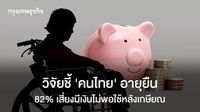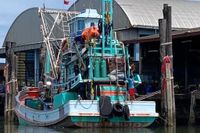In a significant financial study, Krungthai Compass (KTB) has revealed that a staggering 82% of Thai people are worried about their financial security after retirement. This concern is particularly pronounced among younger generations, with many individuals in their 20s and 30s expressing anxiety about their future savings and expenses. As life expectancy increases in Thailand, the importance of effective financial planning for retirement has never been more critical.
According to KTB’s findings, the average Thai citizen will need approximately 8.3 million baht by the time they reach retirement age of 67. This figure includes an average monthly pension of about 35,000 baht from the government, which translates to a lump sum of around 7 million baht, supplemented by an additional 1.3 million baht from personal savings. When combined, these amounts total approximately 8.3 million baht, a figure that many retirees may find daunting.
To illustrate the financial landscape for retirees, KTB has categorized necessary monthly expenses into three distinct levels: a basic standard at 26,000 baht, a comfortable standard at 36,000 baht, and a high standard at 58,000 baht. Alarmingly, KTB’s research indicates that a significant majority—82%—of its members may not meet the financial requirements necessary to achieve the “good” living standard after retirement. This suggests that many civil servants and employees could face financial difficulties, requiring them to adopt a frugal lifestyle post-retirement.
The study highlights several factors that may undermine financial stability for the elderly. Among these are high levels of debt, especially concerning for civil servants aged 55 to 60, who reportedly carry substantial financial burdens. Additionally, the absence of personal housing after retirement, rising living costs, and unforeseen emergencies also contribute to financial insecurity.
In response to these findings, KTB has emphasized the need for proactive financial planning to ensure that individuals can maintain a good quality of life in their later years. The organization has suggested several strategies to enhance financial preparedness:
1. Increase Savings Rates: By boosting their savings during their working years, individuals can improve their chances of achieving their desired financial goals for retirement.
2. Investment Planning: Regularly reviewing and adjusting investment strategies to align with changing life circumstances and risk tolerance can help individuals grow their savings more effectively.
3. Financial Literacy: Continuous education about financial management and investment options is crucial for making informed decisions that suit individual situations.
Meanwhile, the Ministry of Agriculture and Cooperatives is also taking steps to alleviate financial burdens among Thai farmers. On April 15, 2025, the ministry announced Pardon Order 27/2025, which pardoned four Thai fishermen from the fishing vessel S. Jarin 8, who were recently released from detention in Myanmar. These individuals, Mr. Wiroon Supanthong, Mr. Sunan Mongkutthong, Mr. Thawee Phromnimit, and Mr. Sompong Wiwattan, were freed following a pardon from the Myanmar government.
The Ministry has directed the Department of Fisheries to coordinate with relevant agencies to provide assistance to the fishermen affected by this incident. Initial support has already been extended, with consultations and advice provided by the Phang Nga Provincial Fisheries Office. Additionally, the Ministry is working with the Thai-Myanmar Business Council to further assist those impacted by the fishing incident.
Furthermore, the ministry is collaborating with the Fiscal Policy Office (FMC) to consider additional debt relief measures for farmers, recognizing the financial challenges they face. This partnership aims to extend support to farmers, particularly concerning border issues and customs regulations between Thailand and Myanmar.
As the Ministry of Agriculture and Cooperatives continues to expedite the pardon and support for the fishermen, it has also emphasized the need for caution among fishing vessels operating near disputed maritime areas. Following the incident where the S. Jarin 8 was attacked by a Myanmar naval vessel, the Department of Fisheries has issued warnings to Thai fishing boats to avoid entering waters near Koh Phayam, which are considered high-risk zones for maritime security.
In light of these developments, the Thai government is taking proactive measures to ensure the safety of its fishermen while simultaneously addressing the financial concerns of its citizens. With the growing life expectancy and rising costs of living, the need for comprehensive financial planning is becoming increasingly urgent for all Thai citizens, not just those nearing retirement.
As Thailand navigates these challenges, the focus remains on fostering a secure financial future for its people, enabling them to live comfortably and with dignity in their golden years. The call for enhanced financial literacy and planning is echoed across both the government and private sectors, highlighting a collective effort to prepare citizens for a financially stable retirement.






